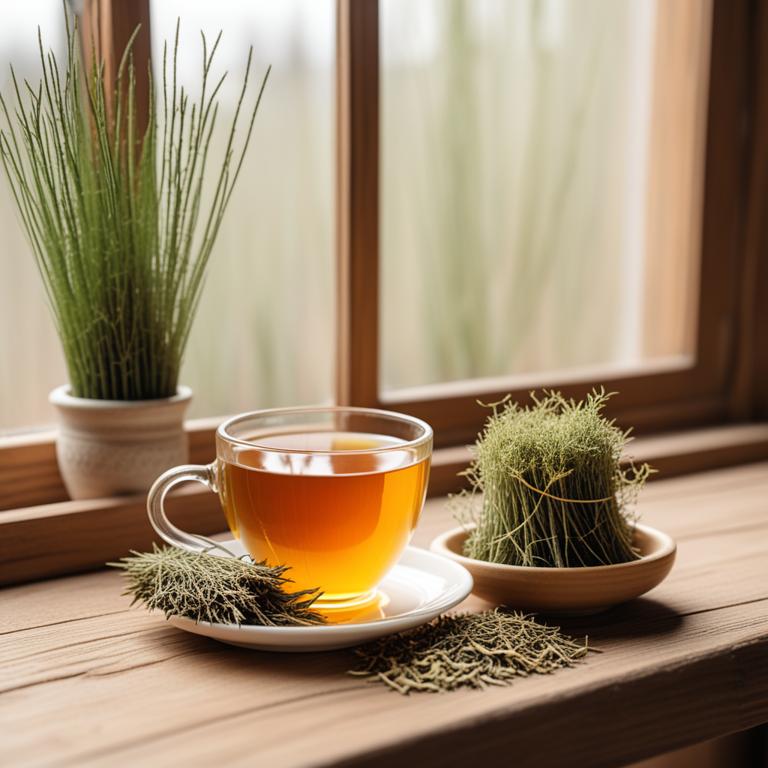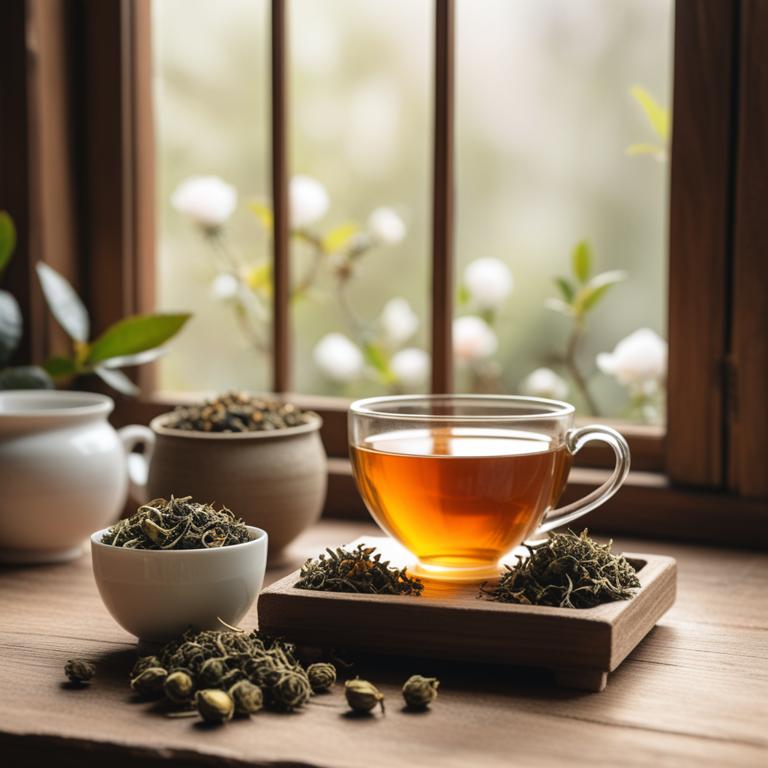10 Herbal Teas For Psoriasis

Herbal teas have been used for centuries to help manage psoriasis symptoms.
Psoriasis is a skin condition that causes red, scaly patches to appear on the skin. These teas work by reducing inflammation and soothing the skin. Urtica dioica, also known as nettle tea, is one example of an herbal tea that may help with psoriasis. It's rich in antioxidants and has anti-inflammatory properties, which can help to reduce redness and swelling. Silybum marianum, or milk thistle tea, is another example.
It's been shown to help reduce the production of inflammatory compounds in the body, which can contribute to psoriasis symptoms. Hypericum perforatum, or St. John's Wort tea, has also been used to help manage psoriasis symptoms. It's been shown to have anti-inflammatory and antiseptic properties, which can help to soothe and calm the skin. Drinking these herbal teas may help to reduce the frequency and severity of psoriasis outbreaks, making it easier to manage the condition. By incorporating these teas into your daily routine, you may find that your skin becomes less inflamed and more comfortable.
This can improve your overall quality of life and make it easier to perform daily activities without feeling self-conscious about your skin.
- 1. Urtica dioica
- 2. Silybum marianum
- 3. Hypericum perforatum
- 4. Glycyrrhiza glabra
- 5. Aloe barbadensis
- 6. Taraxacum officinale
- 7. Echinacea purpurea
- 8. Camellia sinensis
- 9. Calendula officinalis
- 10. Equisetum arvense
1. Urtica dioica

Urtica dioica teas contains boivolatile compounds like isorhapontigenin and chlorogenic acid, which have anti-inflammatory properties.
These compounds help reduce redness and swelling in the skin, making them beneficial for people with psoriasis. The tea's antioxidant properties also help protect the skin from damage caused by free radicals, which can contribute to skin conditions like psoriasis. Additionally, the tea's flavonoids, such as kaempferol and quercetin, have been shown to inhibit the production of pro-inflammatory molecules, which can exacerbate psoriasis symptoms.
By reducing inflammation and protecting the skin, Urtica dioica tea may help alleviate symptoms of psoriasis.
- Gather 1 cup of fresh Urtica dioica leaves or 2-3 teaspoons of dried Urtica dioica leaves.
- Combine the leaves with 1 cup of boiling water in a saucepan.
- Reduce heat and let it simmer for 5-7 minutes.
- Strain the mixture using a tea strainer or cheesecloth into a cup.
- Drink 1/2 to 1 cup of the tea, 2-3 times a day, as needed for psoriasis relief.
2. Silybum marianum

Silybum marianum teas contains flavonoids, silymarin, and other bioactive compounds that help alleviate symptoms of psoriasis.
The flavonoids in Silybum marianum have anti-inflammatory properties, which reduce redness and swelling associated with psoriasis. Silymarin, a key component of Silybum marianum, has antioxidant properties that protect the skin from damage caused by free radicals. The bioactive compounds in Silybum marianum also have immunomodulatory effects, which help regulate the immune system and prevent excessive inflammation that can exacerbate psoriasis.
By reducing inflammation and protecting the skin, Silybum marianum teas may help improve symptoms of psoriasis and promote healthy skin.
- Gather 1 cup of Silybum marianum dried flowers and leaves.
- Measure 1 tablespoon of the dried flowers and leaves and place them in a tea infuser or a heat-resistant cup.
- Pour 1 cup of boiling water over the dried flowers and leaves in the tea infuser or cup.
- Steep the mixture for 5-7 minutes, then strain the liquid into another cup.
- Drink the tea 2-3 times a day, as needed, for relief from psoriasis symptoms.
3. Hypericum perforatum

Hypericum perforatum teas contains hyperforin and hypericin, bioactive constituents that have anti-inflammatory properties.
These compounds help reduce redness and swelling associated with psoriasis. The flavonoids and phenolic acids in Hypericum perforatum tea have antioxidant properties, which protect the skin from damage caused by free radicals. The tea's anti-inflammatory properties also help reduce the formation of keratin, a protein that can build up and cause the scaling associated with psoriasis.
By reducing inflammation and protecting the skin, Hypericum perforatum tea can help manage psoriasis symptoms.
- Gather 1 cup of fresh or dried Hypericum perforatum leaves. Use 1 tablespoon of dried leaves or 2 tablespoons of fresh leaves.
- Place the leaves in a heat-resistant cup or teapot.
- Pour 1 cup of boiling water over the leaves.
- Let it steep for 5-7 minutes, then strain the liquid.
- Drink 1/2 to 1 cup of the tea 2-3 times a day to help manage psoriasis symptoms.
4. Glycyrrhiza glabra

Glycyrrhiza glabra teas contains several bioactive constituents, including glycyrrhizin, flavonoids, and triterpenoids.
These compounds have anti-inflammatory properties, which help to reduce the redness and swelling associated with psoriasis. Glycyrrhizin, in particular, has been shown to inhibit the production of pro-inflammatory cytokines, which contribute to the development of psoriasis symptoms. The flavonoids and triterpenoids in Glycyrrhiza glabra teas also have antioxidant properties, which help to protect the skin from damage and promote healing.
By reducing inflammation and promoting healing, Glycyrrhiza glabra teas may help to alleviate the symptoms of psoriasis.
- Gather 2 tablespoons of dried Glycyrrhiza glabra root, 1 cup of water, and a tea infuser or a heat-resistant cup.
- Boil the water in a kettle or on the stove. Let it cool for 1-2 minutes.
- Add the dried root to the tea infuser or the heat-resistant cup. Pour the cooled water over the root.
- Let the tea steep for 5-7 minutes. Strain the tea into another cup using the tea infuser or a piece of cheesecloth.
- Drink 1/2 to 1 cup of the tea 2-3 times a day, or as directed by a healthcare professional.
5. Aloe barbadensis

Aloe barbadensis teas contains several bioactive constituents, including aloin, aloe-emodin, and acemannan.
These compounds have anti-inflammatory and antiseptic properties, which can help reduce redness and soothe skin irritation associated with psoriasis. The anti-inflammatory properties of aloin and aloe-emodin can also help reduce the swelling of skin lesions, making it easier to manage the condition. Additionally, acemannan has been shown to stimulate collagen production, which can help improve skin elasticity and reduce the appearance of scaly patches.
By consuming aloe barbadensis teas, individuals with psoriasis may experience relief from symptoms and improved skin health.
- Gather 1 cup of Aloe barbadensis gel and 2 cups of water in a saucepan.
- Heat the water over low heat and let it simmer for 10-15 minutes.
- Remove the saucepan from heat and add the Aloe gel to the water.
- Let the mixture steep for 10-15 minutes, then strain it through a fine-mesh sieve.
- Drink 1/2 cup of the Aloe tea 2-3 times a day, as needed, for psoriasis relief.
6. Taraxacum officinale

Taraxacum officinale teas contains bioactive compounds like inulin, taraxasterol, and sesquiterpenoids.
These compounds have anti-inflammatory properties, which help reduce redness and swelling associated with psoriasis. The flavonoids present in Taraxacum officinale, such as quercetin and kaempferol, have potent antioxidant effects, protecting the skin from oxidative stress and promoting healing. Additionally, Taraxacum officinale contains saponins, which have been shown to modulate the immune system and prevent inflammation.
By consuming Taraxacum officinale teas, individuals with psoriasis may experience reduced symptoms and improved skin health due to its anti-inflammatory and antioxidant properties.
- Gather 2 tablespoons of dried Taraxacum officinale leaves and flowers.
- Boil 1 cup of water in a pot.
- Add the 2 tablespoons of Taraxacum officinale to the boiling water.
- Reduce heat and let it simmer for 5-7 minutes.
- Strain the mixture and drink the tea 2-3 times a day.
7. Echinacea purpurea

Echinacea purpurea teas contains alkylamides and caffeic acid derivatives as its bioactive constituents.
These compounds have anti-inflammatory and antioxidant properties that can help reduce inflammation and protect the skin from damage caused by free radicals. The alkylamides in Echinacea purpurea teas also have immunomodulatory effects, which can help regulate the immune system and prevent it from attacking healthy skin cells. The antioxidants present in the tea can also help reduce oxidative stress, a major contributor to the development and progression of psoriasis.
By reducing inflammation and oxidative stress, Echinacea purpurea teas may be beneficial in managing psoriasis symptoms.
- Gather 2 cups of fresh Echinacea purpurea flowers and 1 cup of fresh leaves.
- Combine the flowers and leaves in a large bowl and let them dry for 24 hours.
- Use a coffee grinder or herb grinder to crush the dried flowers and leaves into a fine powder.
- Measure out 1 teaspoon of the Echinacea powder and add it to 1 cup of boiling water.
- Steep the mixture for 5-10 minutes, then strain and drink 1 cup, 2-3 times a day.
8. Camellia sinensis

Camellia sinensis teas contains bioactive constituents like flavonoids, theaflavins, and thearubigins, which have anti-inflammatory properties.
These compounds help reduce redness and swelling in the skin, common symptoms of psoriasis. Flavonoids, in particular, have been shown to inhibit the production of pro-inflammatory cytokines, which contribute to the condition. Theaflavins and thearubigins have antioxidant properties, which help protect the skin from damage caused by free radicals.
By reducing inflammation and oxidative stress, Camellia sinensis teas may help alleviate psoriasis symptoms.
- Gather 1 cup of Camellia sinensis leaves (black, green, or white tea) and 1 cup of boiling water.
- Measure 1 teaspoon of loose tea leaves or 1 tea bag for every 1 cup of water.
- Steep the tea leaves in boiling water for 3-5 minutes to make a strong brew.
- Strain the tea leaves from the brew and let it cool to a comfortable temperature.
- Drink 1-2 cups of the tea per day, ideally with a balanced diet and a healthy lifestyle.
9. Calendula officinalis

Calendula officinalis teas contains flavonoids, triterpenoids, and saponins as its bioactive constituents.
These compounds have anti-inflammatory and antioxidant properties, which help reduce redness and swelling associated with psoriasis. The saponins in Calendula officinalis teas also have antiseptic and antimicrobial properties, which can help prevent infection and promote wound healing in psoriasis-affected skin. The flavonoids, particularly quercetin, have anti-inflammatory effects that can reduce the severity of psoriasis symptoms.
By reducing inflammation and promoting wound healing, Calendula officinalis teas may provide relief from psoriasis symptoms.
- Gather 1 cup of Calendula officinalis flowers and 1 cup of boiling water.
- Measure 1 tablespoon of Calendula flowers and add to a heat-resistant cup.
- Pour 1 cup of boiling water over the flowers and let it steep for 5-7 minutes.
- Strain the tea into another cup using a cheesecloth or a fine-mesh sieve.
- Drink 1 cup of the tea 2-3 times a day, or as directed by a healthcare professional.
10. Equisetum arvense

Equisetum arvense teas contains bioactive constituents like equisetic acid, isoflavones, and saponins.
These compounds have anti-inflammatory properties, which can help reduce redness and swelling associated with psoriasis. The saponins in Equisetum arvense teas also have a cleansing effect, removing dead skin cells and promoting skin renewal. Additionally, the isoflavones in the tea have antioxidant properties, which can help protect the skin from damage caused by free radicals.
The combination of these properties makes Equisetum arvense teas a potentially effective treatment for psoriasis symptoms.
- Gather 1 cup of fresh or dried Equisetum arvense (Horsetail) roots and stems.
- Measure 1 tablespoon of the plant material and place it in a heat-resistant cup or mug.
- Pour 1 cup of boiling water over the plant material and let it steep for 5-7 minutes.
- Strain the tea into another cup using a fine-mesh sieve or cheesecloth to remove the plant material.
- Drink the tea 2-3 times a day, ideally between meals, to help alleviate psoriasis symptoms.